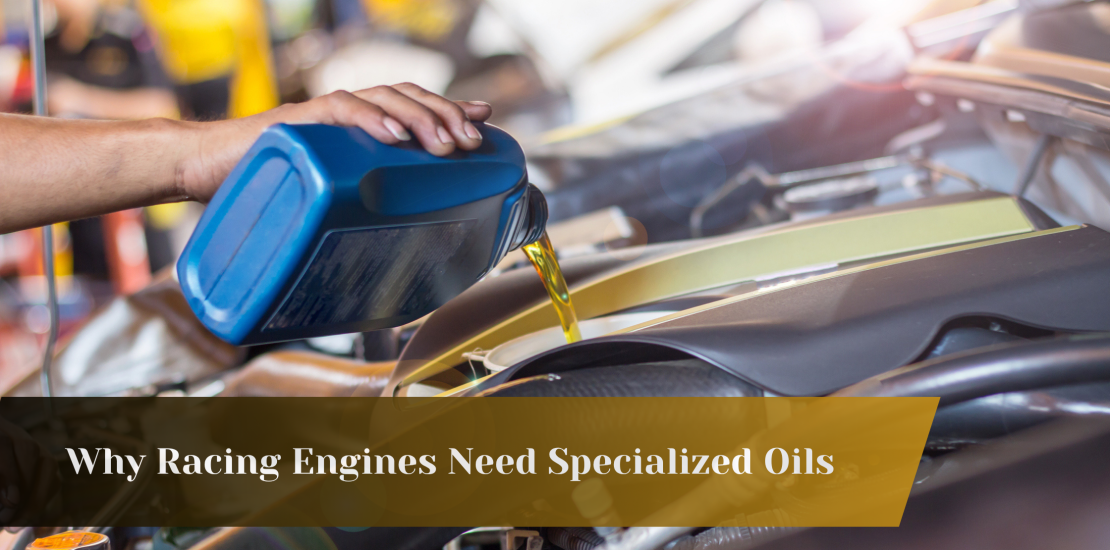Why Racing Engines Need Specialized Oils
- October 15, 2025
- Posted by: General Petroleum
- Category: Blogs

In terms of performance and acceleration, racing engines are in a class by themselves. Racing engines go through extreme conditions — from scorching temperatures to massive mechanical pressures — that regular oils are not equipped to endure. That’s why engineers, mechanics, and racers in the UAE always use the best racing oil, due to the country’s respect for motorsport and the best technology in lubricants. Considering the UAE’s weather and road condition, we should always select oils that offer the best protection, are designed to reduce friction, and provide better engine performance. The appropriate lubricant choice isn’t so much about keeping the engine purring — it’s about the win on the racing track.
With years of lubrication innovation experience, the Hydraulic oil company UAE industry has become a centre for creating high-performance oils for the most demanding settings. Racing engines require oils that retain viscosity at very high temperatures, and that do not oxidize under sustained, high speed service conditions. Regular engine oil tends to emphasize longevity and fuel efficiency, while racing oils prioritize maximum performance over brief periods of performance and action. Racing oils must withstand extremely high RPMs, prevent metal-to-metal contact, and friction reduction on the components being used to minimize any power loss. The quality of performance is indicative of the UAE quickly becoming a world class automotive technology and lubricant manufacturer.
Understanding the distinctions between different lubricants is very important for every vehicle owner and motorsports enthusiast. A prime example is the article, Grease vs. Oil in UAE: Choosing Lubrication for Your Machinery, which illustrates how the right lubricant can impact performance and reliability significantly. In racing engine applications especially, using the wrong type of oil or viscosity can easily lead to overheating, wear, or even catastrophic failure. That is where specialty performance oils become critical — they are formulated with specialty additives, such as anti-wear agents, detergents, and dispersants that will keep even the most highly stressed engine both cleaner and cooler. These oils do more than simply protect against friction; they also help create a barrier against corrosion, oxidation and deposit formation, which provides the potential for performance consistency and long engine life.
When it comes to knowing how to make the proper oil choice, the Guide to Choosing the Best Diesel Engine Oil in UAE For Your Vehicle provides great insight that applies even to racing conditions. Though diesel and racing engines have design differences, both require lubricants that can hold stability even under pressure. The same technology that goes into making high-performance diesel oils — heat resistance, film strength, and oxidation control — is central to making racing oils too. The result is that racing oils in the UAE are designed with great care, frequently using synthetic base stocks that provide consistent performance over a range of temperatures.
The Science Behind Specialized Racing Oils
Racing oils are made differently than regular lubricants. Their main function is to minimize friction between moving parts and to preserve their protective film even in extreme temperatures. In contrast to standard oils which focus on draining intervals, racing oils focus on performance during shorter and more intense operating cycles. High quality racing oils also contain higher concentrations of anti-wear additives (prioritizing zinc dialkyldithiophosphate (ZDDP) which protects engine parts against wear during aggressive acceleration and braking cycles.
These specialty oils also provide superior thermal stability. In high-speed racing, the engine can run as high as 150°C, and regular oils begin to break down at these temperatures, while specialty racing oils keep viscosity and molecular structure stability; thus, specialty racing oils remain sludge, varnish, and carbon deposit free, which in turn, allows for better performance. In addition, they keep pistons moving smoothly, ensure good combustion, and lose little energy — all of which translate into improved horsepower and durability.
Role of Additives and Formulation
Another important factor that sets racing oils apart from other motor oils is the use of advanced additive technology. The additives such as detergents, dispersants, anti-oxidants and friction modifiers are specifically balanced against each other to yield optimum. In racing oils, the additive concentration is more in order to help engines, which always work under maximum load. The formulation keeps oil film strength intact and offers superior wear protection during high-speed gear changing and extended racing hours.
The base oils in racing lubricants are usually completely synthetic in nature, with great film stability and low volatility. This prevents the oil from evaporating or degrading under severe track conditions. The outcome is a smoother-running engine with less downtime and longer life for components — all important advantages for racing professionals who can ill afford performance inconsistencies.
Why Regular Oils Can’t Compete
Putting standard motor oil in a racing engine is akin to refueling a jet with regular-grade gasoline — it just won’t cut it. Regular oils are formulated for typical driving conditions where temperatures, RPM, and stress are much lower. Racing oils, by contrast, are engineered for boundary-pushing engines. They’re formulated to stay on their game under heat, withstand shear stress, and provide consistent lubrication regardless of how demanding the race.
Further, racing engines see increased fuel dilution, wherein the oil gets mixed with unburned fuel from rich fuel-air mixtures employed to generate more power. These oils are formulated to resist the dilution while maintaining the viscosity and lubrication properties required to protect components like camshafts, bearings and turbochargers.
The UAE’s Growing Motorsport and Lubricant Industry
The UAE’s emergence as a motorsports powerhouse has also driven its need for high-end lubricants. It has prompted regional manufacturers and distributors to heavily invest in formulating racing oils specifically suited for the region’s hot and sandy climates. The developments involve new synthetic formulations that are resistant to thermal degradation while ensuring high-performance wear protection. The best racing oil in UAE brands are now on par with international players, catering to everything from Formula racing to desert off-road events.
Also, the Hydraulic oil company UAE market is still growing in the performance segment, connecting industrial know-how to car technology. With this knowledge, producers of lubricants in the UAE are manufacturing global standard racing oils that meet the special needs of racers and car enthusiasts.
Final Thoughts
Racing engines are the ultimate feat in engineering — so they should get only oils that can keep up. There is no reason racing oils should just be viewed as a performance-enhancing luxury, they are essential to guarantee performance, durability and speed. Whether you’re selecting from the Best racing oil in UAE or learning from the Guide to Choosing the Best Diesel Engine Oil in UAE For Your Vehicle, understanding the science and purpose behind these oils ensures your engine performs flawlessly.
In a world that reveres power, precision, and performance, the UAE is steadfastly leading the way in producing lubricants which are the benchmark of excellence on or off the race track. For drivers, racing teams and fans alike, the premium of racing oil commitment is the greatest assurance of performance – race after race and win after win.

